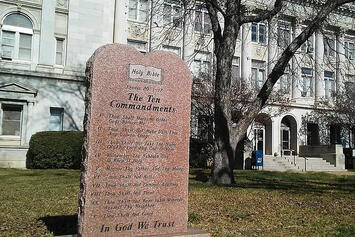
The state of Louisiana just passed a law mandating the the Ten Commandments be put on display in public school classrooms in the state.
I believe this law is unwise, reflects a poor understanding of cultural conditions, and shows that a large number of American Christians are still living in a culture war mindset.
In my book about how America has transitioned towards a Negative World for Christians, I wrote about the need to stay prudentially engaged, and that different people are going to come to different good faith conclusions about the right actions to take. I wrote:
Prudential engagement also recognizes that not all evangelicals will come to the same conclusion about where and how to be involved politically and socially. We should be tolerant of evangelicals who make a different decision than we do in this matter. That doesn’t mean we avoid political conversations or refrain from critical evaluations of other people’s approaches. It’s perfectly valid to say, as I just did, that the counsel advocating political disengagement should be rejected.
But we should respect those who hold views different from our own and seek to be attuned to them when they’ve honestly made a different decision.
So in this case, I’ll say that I simply come to a different prudential judgment than the folks in Louisiana. I don’t think this is a blatantly illegitimate act. Not only would this have been very constitutional, even normal, for the vast bulk of American history, there are people my age who’ve been noting how they had the Ten Commandments in their classrooms when they were in school.
The courts may very well rule that this law unconstitutional. I choose to view the malleability of our constitution in that way as a feature not a bug. Meaning I too want to change various things that are presently viewed as “the constitution.” There’s no reason for anyone to treat current jurisprudence as settling anything, given that neither the left, nor America’s judges themselves, behave in that manner.
So I don’t think this law is per se illegitimate or outside the American tradition. I just think it’s unwise.
Why do I say that?
Read the rest of this piece at Aaron Renn Substack.
Aaron M. Renn is an opinion-leading urban analyst, consultant, speaker and writer on a mission to help America's cities and people thrive and find real success in the 21st century. He focuses on urban, economic development and infrastructure policy in the greater American Midwest. He also regularly contributes to and is cited by national and global media outlets, and his work has appeared in many publications, including the The Guardian, The New York Times and The Washington Post.
Photo: courtesy Aaron Renn.












